"Disappointed in debate in the House about diversity"
According to Education Minister Ingrid van Engelshoven, educational institutions and academic staff are “rather disappointed” that the House of Representatives is so split over the universities’ diversity policy. In a fiery debate on Monday, the House of Representatives discussed emancipation. Academic freedom and the ratio of women to men in education were among the other issues raised.
Harm Beertema (PVV) kicked off the debate by criticising the ‘gender plans’ in higher education. With her plans and guidelines the minister is harming “academic freedom and scientific thinking”, he said.
Woke
The ‘woke discussion’ was further inflamed by Roelof Bisschop. According to the SGP Member, academic staff are walking on eggshells. “If you simply use the wrong word or are not sufficiently diverse or inclusive enough at a university, it can – figuratively speaking – cost you your head.” He asked the minister to consider the role of diversity officers, for example.
The minister acknowledged that academic staff are under pressure, but that is the case on many fronts, she said. She referred to the intimidatory stickers targeting ‘left-wing’ academic staff. “I think we all ought to take a firm stand to ensure that academic staff can be free to research whatever they want and to talk about and publish that research freely.”
Academic freedom
But universities decide their own diversity policy, including the diversity officers. She did not dictate that policy, she stressed. “I have to say that the institutions and academic staff were rather disappointed about the debate in this House.” Precisely in the context of academic freedom, universities consider diversity “of huge importance”, she explained.
According to Van Engelshoven, aspiring to diversity and inclusion does not inspire heated debate in the rest of Europe. “In other countries it is perfectly normal.” The European Commissioner for Bulgaria was surprised by the heated reactions in the Netherlands, says the minister. In her opinion, that makes the Netherlands more of a “maverick” than “mainstream”.
Professors
The question of the under-representation of women among professors was raised too. “If we don’t get a move on, we won’t get gender equality among professors before 2041”, said Lisa Westerveld (GroenLinks).
The PVV raised the subject of the experiment at TU Eindhoven, where for a time only women academics were taken on so as to get the ratio of women to men into balance. “Reverse discrimination”, Beertema argued.
The minister was not very concerned by that. In her view finding a good way to redress the balance is sometimes “a bit of a juggling act”. “But I applaud the fact that they wanted to do so.”


Discussion